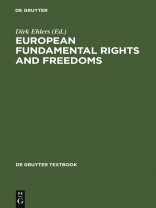The ever increasing relevance of European law which involves replacement or supplementation of and interaction with national law not only affects the states in Europe but also, and foremost, the citizens. The rights of the citizens in Europe are protected by the European Fundamental Rights and Freedoms. The aim of this textbook is to grasp and illustrate the meaning of these rights and to integrate it into a coherent system. For this purpose the book not only deals with the pertinent law of the European Union and the European Community, but also with the European Convention for the Protection of Human Rights and Fundamental Freedoms which, too, is becoming more and more important. In addition, regard is had to the Charter of Fundamental Rights of the Union which forms part of the Treaty establishing a Constitution for Europe. Although the Charter is not yet legally binding since the Constitution has not been ratified by all EU Member States, the Community Courts already make reference to it as a concentrate of the constitutional traditions common to the Member States. It therefore does not seem entirely unlikely that the Charter might be included into the existing Treaties irrespective of the future constitutional developments on the EU level. On a similar anticipatory basis the book also takes into account those Protocols to the European Convention for the Protection of Human Rights and Fundamental Freedoms that have not yet entered into force.
Tabla de materias
Part I: The Notion of European Fundamental Rights and Freedoms
Christian Walter: History and Development of European Fundamental Rights and Fundamental Freedoms
Part II: European Convention for the Protection of Human Rights and Fundamental Freedoms
Dirk Ehlers: General Principles; Robert Uerpmann-Wittzack: Personal Rights and the Prohibition of Discrimination; Thilo Marauhn: Freedom of Expression, Freedom of Assembly and Association; Bernhard W. Wegener: Economic Fundamental Rights; Christoph Grabenwarter: Fundamental Judicial and Procedural Rights.
Part III: The Fundamental Freedoms of the European Communities
Dirk Ehlers: General Principles; Astrid Epiney: Free Movement of Goods; Ulrich Becker: Freedom of Movement for Workers; Christian Tietje: Freedom of Establishment; Eckhard Pache: The Free Movement of Services; Peter v. Wilmowsky: Freedom of Movement of Capital and Payments; Thorsten Kingreen: Prohibition of Discrimination Due to Nationality.
Part IV: The Fundamental Rights of the European Union
Dirk Ehlers: General Principles; Frank Schorkopf: Human Dignity, Fundamental Rights of Personality and Communication; Matthias Ruffert: The Right to Pursue a Freely Chosen Occupation; Christian Calliess: The Fundamental Right to Property; Thorsten Kingreen: Basic Rights of Equality and Social Rights; Jörg Gundel: Judicial and Procedural Fundamental Rights; Christian Calliess: The Charter of Fundamental Rights of the European Union.
Part V: Citizenship Rights in Europe
Stefan Kadelbach: European Citizenship Rights.
Sobre el autor
Ulrich Becker, Professor of law at the Ludwig-Maximilians-Universität Munich, Max Planck Institute for Foreign and International Social Law; Christian Calliess, Professor of law at the University of Göttingen; Dirk Ehlers, Professor of law at the University of Münster; Astrid Epiney, Professor of law at the University of Freiburg, Switzerland; Christoph Grabenwarter, Justice of the Constitutional Court of Austria, Professor of law at the Vienna University of Economics and Business Administration; Jörg Gundel, Professor of law at the University of Bayreuth; Stefan Kadelbach, Professor of law at the University of Frankfurt a. M.; Thorsten Kingreen, Professor of law at the University of Regensburg; Thilo Marauhn, Professor of law at the University of Gießen; Eckhard Pache, Professor of law at the University of Würzburg; Matthias Ruffert, Professor of law at the University of Jena; Frank Schorkopf, Research Fellow at the University of Bonn; Christian Tietje, Professor of law at the University of Halle, Robert Uerpmann-Wittzack; Professor of law at the University of Regensburg; Christian Walter, Professor of law at the University of Münster; Bernhard W. Wegener, Professor of law at the University of Erlangen-Nürnberg; Peter v. Wilmowsky, Professor of law at the University of Frankfurt a. M.












